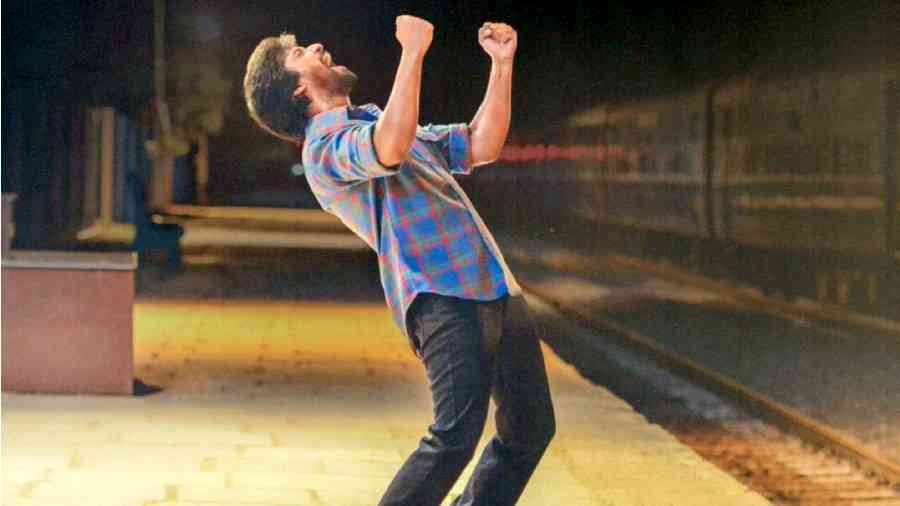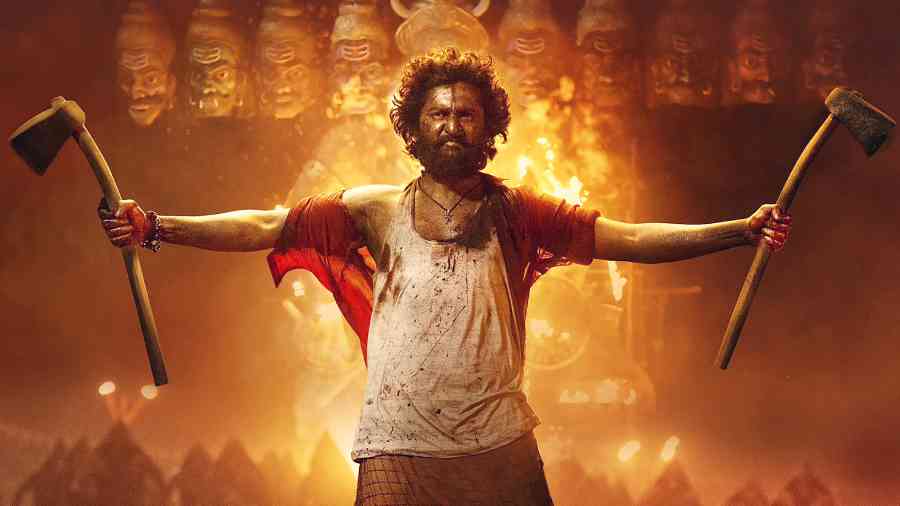Dasara is a humongous hit, cruising into the Rs 100-crore club within eight days of its release. At the front and centre of the big-budget Telugu action film is superstar Nani. The actor, who is known as ‘Natural Star’ down south, steps out of his comfort zone to play a ruffian with a heart in the film that registered bigger box-office numbers than Ajay Devgn’s Bholaa released on the same Friday. Flushed with success, Nani — who has winners like S.S. Rajamouli’s Eega (which released in Hindi as Makkhi), Yevade Subramanyam and Jersey (with Shahid Kapoor playing Nani’s role in the Hindi remake of the same name), among others on his filmography — chatted with t2.
Dasara has made a huge impact, both in terms of box-office numbers and critical acclaim. What’s been the standout moment for you so far?
Online, there have been paragraphs and paragraphs of praise from all those who have loved the film. The reactions are coming in from every corner of the world. An old lady came up to me and held my hand and told me: ‘I have seen the cinema of N.T. Rama Rao sir and when I saw you on screen, I felt the same emotions’ (smiles). For me, that was the greatest thing that I have ever heard. The way she said it was very special to me.The feedback that has come in so far just doesn’t say things like: ‘The film is good, you did well,’ but everyone is writing really long messages to express how much they loved the nitty-gritty of the film. For the first time in my career, I took screenshots of these messages, especially because they were written so creatively and emotionally.
S.S. Rajamouli, who directed you in Eega, has said this is the best performance of your career so far....
I don’t know, really (smiles). I always try and ensure that I put in my best in every role I do. I gave all I had to this character (named Dharani) in Dasara because it demanded a lot out of me, both physically and emotionally. I am happy that people have been able to see that on screen.
This is your first Rs 100-crore film. How important are box-office numbers to you?
I don’t do films with an eye on the box office. But they are important, in the sense that in order to continue doing the kind of films that I want, I need numbers at the box office to back me up. When a film works, it definitely counts. When a film of mine works, I can dream a little more and make my vision larger when it comes to future projects.
If a story needs to be told in a certain way, the fact that my previous film has earned a certain number always helps and supports. It is important, but it can’t be the only thing. The most important thing to do is pick the right content and give our best to it. And if the numbers come in, then that gives us a lot of energy to do a lot more.
What do you think worked for Dasara?
I think everything worked for the film. More than ever, the audience is now excited to get into the theatre and be transported into a different world. Viewers are eager to see a world on the screen that they haven’t seen before... to experience new characters and their lifestyle is something that is extremely exciting for the audience. In the last couple of years, the films that have done very well at the box office have been ones where world-building has been very strong. At the same time, the emotions have to be deep and impactful.
Dasara is a film which has a perfect mix. Generally. what happens is that you don’t get all elements in a film... something goes missing. Dasara has had an organic combination of visually appealing moments, great action scenes and visceral emotions. It’s all very beautifully written and very subtly performed.
Before release, did you have apprehensions that Dasara is more or less set in the same world that we have seen in the KGF films and would hence invite comparisons?
Honestly I didn’t, because I knew from the beginning that the two films are very different from each other. Only when we dropped the poster and the teaser and the media started asking me questions about the common factors between Dasara and KGF did I realise that: ‘Oh, there is this possibility also!’ (Laughs) After the release of Dasara, no one has spoken about any comparison. I always knew what the content of Dasara was, and how different it was from KGF — in set-up, world and story — and so these comparisons didn’t bother me.

Nani in Jersey, which was made into the Hindi film of the same name, starring Shahid Kapoor
You are called ‘Natural Star Nani’ for a reason, given that your performances have more often than not been subtle and real. Dharani is largely an over-the-top character. How far did you have to step out of your comfort zone to play him?
I actually don’t have a comfort zone (smiles). People think that I have a comfort zone because there are three-four films of mine that worked in a certain genre. If I do a few more films like Dasara and they work as well as it did, then they will start saying that this is my comfort zone.
The idea of comfort zone for me is to not be in any kind of a comfort zone. Not getting stuck in a particular type of role is my comfort zone. When I heard my character’s story, it was fascinating for me because it didn’t fall into anything I had done before. If I am not excited thinking about the part that I am playing then it’s difficult for me to sustain that kind of energy throughout the film. Anything new, something that I haven’t done before is actually my comfort zone. Doing the same thing over and over again is extremely difficult for me.
What excites me the most is landing up on set every day and thinkin:‘What do I do today? How do I pull this off?’ If a role is a cakewalk, then I feel no passion to do it. It has to be a challenge for me in order to excel.
Once a certain kind of story or formula becomes a hit, the actor in question is inundated with similar roles. Have you faced that in your career?
It happened in the initial part of my career, but I have managed to consciously break that now. Initially, people used to say that Nani does well with rom-coms. I started doing potboilers and when those films became blockbusters, the same people said that these kinds of films are best for Nani. After that, when Jersey earned both box-office numbers and critical acclaim, then they said: ‘Oh, Nani can do well in this genre also’ (smiles). Then Shyam Singha Roy and now Dasara have come and I have continued breaking the mould that I am forced into every time I do a film. Finally, I am in a space where I am not bracketed and makers can pitch all kinds of scripts to me. I am happy that I have reached this stage, but it definitely has been a process.
‘Pan-Indian film’ is now a part of everyone’s vocabulary, with a pan-Indian film announced almost every week. What’s your take?
Personally, I don’t believe in this term. A film can be called pan-Indian only when appreciation for it comes from across the country. So a film can be called pan-Indian only after it releases and achieves success from all corners and makes an equal amount of noise all over. But nowadays, films are announced as pan-Indian films. We don’t get to decide what is pan-India... everyone can release films in multiple languages... what truly makes it one is all-round success.











